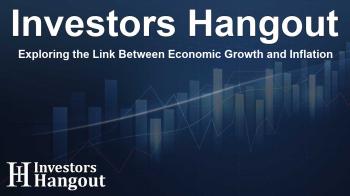Exploring the Link Between Economic Growth and Inflation

The Complex Relationship Between Economic Growth and Inflation
In the field of economics, there exists a widely held belief that rapid economic growth inevitably leads to inflation, while slow growth results in either disinflation or outright deflation. Intriguingly, this notion persists despite a lack of concrete evidence supporting it. Often, the theoretical framework suggests that vigorous growth exerts pressure on essential economic resources—land, labor, and capital—driving up prices and subsequently the value of output. However, historical data contradicts this theory, revealing a nuanced relationship.
Recent Economic Crises and Inflation Trends
Examining recent global economic crises provides valuable insights. The significant downturn in 2008 serves as a pivotal moment, marking the most substantial economic contraction since the Great Depression. Subsequently, in 2020, when the pandemic struck, the economic decline surpassed even the global financial crisis. Commonly, one would hypothesize a corresponding decrease in inflation during these crises. However, this is not what the data reveals.
Inflation Trends During Economic Contraction
Consider the Core Consumer Price Index (CPI) during these periods. In 2010, after the Great Financial Crisis, inflation levels only saw minimal deceleration, dropping to a mere +0.6% year-on-year at one point. Remarkably, deflation did not occur despite the housing market collapse, which heavily impacted CPI measurements. Fast forward to the COVID-19 pandemic, and we observe that core inflation surged significantly, even well after economic activities resumed normalcy.
The 1970s: A Case Study
The economic landscape of the 1970s presents another compelling example. During this decade, numerous instances occurred where GDP growth stagnated or declined, yet inflation persisted. Notably, the OPEC oil embargo led to soaring energy prices; however, it did not alleviate pressures on other sectors, resulting in robust inflation throughout the decade.
Statistical Analysis of Economic Patterns
To delve deeper into this relationship, scatterplots comparing year-over-year (y/y) changes in GDP against core CPI changes were constructed. Different lags were examined, providing various perspectives on how current and past growth influences inflation metrics. The correlation coefficients derived from these analyses revealed weak relationships: -0.18, -0.13, 0.03, and 0.14. Such low figures challenge the narrative that economic growth strongly correlates with inflation.
Re-evaluating Economic Correlations
Expanding the analysis to include the broader headline inflation since 1960, similar low correlation coefficients emerged: -0.11, -0.05, 0.10, and 0.11. Even in the context of the oil crisis, one would expect a more pronounced relationship between growth and inflation, yet the data fails to substantiate this claim.
A Historical Perspective
Historically, if we examine GDP growth against headline inflation from 1929 to 1960 (excluding 1946), an initial correlation of 0.73 arises. This figure becomes even more pronounced at 0.88 when aligning growth and inflation between 1929 and 1945. But, this correlation reflects a specific economic context heavily influenced by post-war conditions, which evolved significantly over the decades. The landmark publication of Paul Samuelson's *Economics* in 1948 popularized this relationship, yet it has mellowed considerably in subsequent years.
The Federal Reserve's Policy Dilemma
The persistence of the idea that growth automatically leads to inflation has significant implications for monetary policy. The Federal Reserve often operates under the assumption of a singular dial that manages growth against inflation. However, economic realities demand acknowledging that there are multiple factors at play. In practice, the Fed should primarily focus on regulating the money supply while encouraging natural market growth rather than attempting to manage both outcomes simultaneously. Historical trends indicate that interventionist measures typically yield suboptimal results.
Frequently Asked Questions
What does the article argue about economic growth and inflation?
The article challenges the conventional belief that rapid economic growth directly causes inflation, presenting historical data and statistical analysis to support this view.
How have recent economic crises influenced inflation levels?
Recent crises, particularly the 2008 financial collapse and the COVID-19 pandemic, demonstrated that inflation can persist even during substantial economic contractions.
What role did the 1970s play in understanding inflation?
The 1970s served as a critical case study, illustrating that inflation remained robust despite periods of stagnant or declining GDP, often exacerbated by external shocks such as the oil embargo.
What statistical methods were used to assess the correlation between GDP and inflation?
Scatterplots analyzed year-over-year changes in GDP and CPI over multiple lags to determine potential relationships, resulting in weak correlation coefficients.
What recommendations are made regarding Federal Reserve policy?
The article suggests that the Federal Reserve should prioritize managing the money supply rather than attempting to control growth directly, promoting a more effective economic strategy.
About The Author
Contact Dominic Sanders privately here. Or send an email with ATTN: Dominic Sanders as the subject to contact@investorshangout.com.
About Investors Hangout
Investors Hangout is a leading online stock forum for financial discussion and learning, offering a wide range of free tools and resources. It draws in traders of all levels, who exchange market knowledge, investigate trading tactics, and keep an eye on industry developments in real time. Featuring financial articles, stock message boards, quotes, charts, company profiles, and live news updates. Through cooperative learning and a wealth of informational resources, it helps users from novices creating their first portfolios to experts honing their techniques. Join Investors Hangout today: https://investorshangout.com/
The content of this article is based on factual, publicly available information and does not represent legal, financial, or investment advice. Investors Hangout does not offer financial advice, and the author is not a licensed financial advisor. Consult a qualified advisor before making any financial or investment decisions based on this article. This article should not be considered advice to purchase, sell, or hold any securities or other investments. If any of the material provided here is inaccurate, please contact us for corrections.

